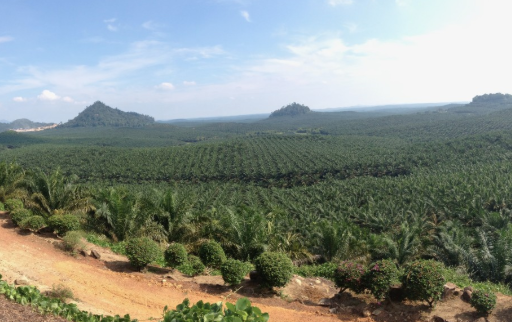I’m often asked how I feel about our work in oil palm. So here’s my take on it – why it’s an important crop, the role of sustainable sourcing, and how our work at PBS International fits in.
In Europe we hear a lot of negative press about the environmental impact of oil palm sector. Rightly so – there are some deeply uncomfortable questions, and the links with tropical deforestation and associated biodiversity loss make me very uneasy.
However, to blame that devastation solely on oil palm is profoundly misleading. I have been dealing with customers in South East Asia for decades (I first visited Malaysian oil palm plantations in 1995) and have had the opportunity to go beyond the headlines to see a more nuanced picture.
If there is one thing all this has taught me, it’s that it’s not one-dimensional topic. At all. There are no easy solutions, and oil palm is just one of many commodities we use all the time which come with a significant environmental cost.
What follows is my summary of the key issues and – after wrestling with the topic – why I am broadly at ease with PBS International’s involvement in this sector.
What are the issues?
As I see it, the Oil Palm issue has four elements:
1. Production of calories and oil – the alternatives & their environmental impact
2. The properties of oil derived from palm – are there direct substitutes?
3. The role of oil palm in the economies of lower income countries
4. Other factors causing deforestation
Underlying the all of these elements is human population growth. There were 3.7m souls on the planet in 1970, there are c. 8bn today, and forecast to be 10bn by 2050. All these people need to eat. Quite naturally they also want to clothe, house, educate and care for their families – for which they need an income. Keeping this population growth picture in mind is essential as we walk through the details.
1. Production of calories and oil – the alternatives & their environmental impact
If we were to magically eliminate oil palm overnight, where would the world turn to replace it? The primary place would be other oil crops – soy, oil seed rape, sunflower etc. These yield dramatically less oil per hectare than oil palm. The consequence is if the calorie / oil deficit were made up by other crops, far more land has to be farmed – taken out of its natural state. This this may be in other parts of the world – from the Amazon to the Ukraine – but its impact is still hugely damaging in, for example, habitat loss and Co2 emissions.
A quick watch which describes the issue is here.
2. The properties of oil derived from palm – are there direct substitutes?
Palm oil is widely used because it has unique or unusual properties. For instance, it can be solid or semi solid at room temperature. Prior to the availability of oil palm we relied much more upon animal fats and hydrogenated oils. These alternatives have downsides – on cost, health impact and/or the environment.
An article which touches on these issues is here.
3. The role of oil palm in the economies of lower income countries
Oil palm is a major export for many equatorial, lower income countries. It has had a significant impact on their economic development overall. In addition a significant proportion of production of oil palm area is held by smallholders, who are often able to obtain a larger and more reliable income from growing oil palm than most other agricultural commodities.
I found it surprisingly difficult to find balanced articles on the nation-state benefits of oil palm for countries like Malaysia and Indonesia, for whom it is a huge source of export revenue and employment (up to 50m people in Indonesia alone employed in the oil palm sector). I suspect, however, that reflects more on my sources than on the impact!
Here is an economic perspective from a smallholder in an emerging oil palm producer, Cameroon here.
Also, a thoughtful article about the “moral minefield” of oil palm:
4. Other factors causing deforestation
Deforestation isn’t simply a one-sector problem. I don’t say that to pass the buck, but because failing to consider wider issues will not improve the situation.
Forest clearance for timber, beef production, soy are also major drivers of deforestation. These factors are typically interlinked – for example logging occurs first which extracts high value timber and creates roads, by which settlers come in and clear further land for agriculture. Often, while corporate indifference may be a factor, this is heavily driven by poverty, inadequate protection in law for forests, and few penalties for ignoring laws where they do exist.
A good summary of this angle – albeit rather dated – is here and another here
So, what can we do?
None of these elements condone or excuse the appallingly extractive practices that have happened and still happen too often. But it is complicated, and I believe that banning or avoiding oil palm in its entirety would be short sighted and counterproductive. Focusing on adoption of good practices and deterring the bad actors is far more impactful than banning the stuff outright. Here is interesting explanation of how Dr Stephanie Schlutter, a wildlife biologist, came to this view, and here is a balanced watch on how the disparate factors interact in a complex way.
In the context of a growing and increasingly affluent human population, my belief is that we should:
1. Use existing agricultural land more intensively so more can remain untouched.
2. Change how we consume: source sustainably, avoid waste.
3. Support low income countries to grow their economies with environmental production.

1. Use agricultural land more intensively
12% of green house gas emissions come from land use change. How can we support a rising population on the same amount of land?
Intensification is sometimes viewed as an evil in its own right, but the evidence is accumulating that using less land intensively – indeed, professionally – is probably better for the environment. You can read more on this thinking here.
As PBS International, pretty much all our work supports this goal. Disease resistance, yield per plant, drought resistance – breeding all these characteristics and more into plants ensures that output per hectare is as high as possible so that fewer plants (and less land) are required to meet human needs.
In oil palm, using the right hybrid seeds (tenera) increases oil yields per hectare by 30%. Our pollination bags are used to produce these hybrids. Our bags are also used in breeding programmes to develop more productive plants, so that each time replanting occurs, higher and higher yielding plants (“elite palms”) are used. From meeting our customers and seeing their Oil Palm breeding programmes first hand we know, with certainty, that “more from less” is absolutely their priority.
2. Change how we consume: source sustainably, avoid waste
If giving up oil palm is counterproductive, demanding sustainably produced oil most definitely is not.
The Round Table on Sustainable Palm Oil (RSPO) is the foremost organisation supporting this goal, founded at WWF instigation to define standards, monitor compliance and advance the use of sustainably produced palm oil. None of the sustainable oil palm production programmes are perfect, but all are a big step forward from nothing.
However, only 19% of the world’s oil palm is RSPO certified, and much of the oil is consumed in lower income regions (eg China, India) where other considerations often trump sustainability. We must use our influence in the affluent countries to drive the sustainable production agenda and reduce waste from field to consumption.
As PBS International, we frequently discuss European demands for sustainability with our customers, and momentum is building. At the International Palm Oil Conference (PIPOC) in Malaysia last year hundreds of research posters were on show discussing sustainability, efficiency, reduction of waste etc – masses of brain power being used for the good.
3. Support low income countries to grow their economies alongside environmental production
I don’t have any links to share on this angle, this is more about my personal values.
I believe that people in all parts of the world want to send their kids to school, pay for healthcare, live in a comfortable home – things we in the UK sometimes take for granted.
I believe that we cannot afford, as a planet, to see lower income countries follow in the west’s footsteps in damaging the environment and developing wasteful habits on their path to economic growth.
I believe we should support other countries to develop their economies – but with as much care for the environment as possible. Just as many parts of the world leapfrogged the landline phone – going from no phones to mobiles – I’d like to think that poorer countries can have a more affluent future while simultaneously avoiding the environmental mistakes of the west.
The best ways to do this? I’d humbly suggest positive sources of influence – trading responsibly, buying sustainably produced commodities, sharing best practice, developing & making available greener technologies, consuming thoughtfully and leading by example. These are all a good place to start.
I began this piece by saying I’m not ashamed of our work in oil palm. True, the industry has a lot to answer for. But so, frankly, do many sectors in agriculture and indeed every corner of the economy. As PBS International, our contribution is to ensure the palms are as robust and productive as they can be, so less land and other inputs are required. And we will lend our voice to the importance of sustainable development in a complex and sensitive area.
The original article is available on here on LinkedIn and as you’ll see from the comments, it certainly created some debate!
https://www.linkedin.com/pulse/we-work-oil-palm-im-ok-hannah-senior/?trackingId=4OnmW4mnrbigU03RfSldzA%3D%3D
Hannah Senior
CEO of PBS International


